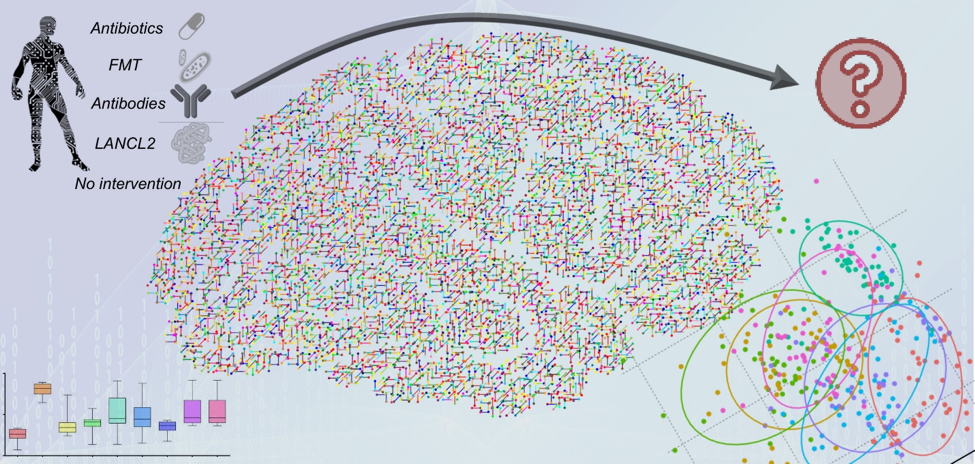Modeling and Artificial Intelligence Systems For Accelerating Drug Development

The Nutritional Immunology and Molecular Medicine Laboratory (NIMML) has developed a computational pipeline to test and predict the efficacy of existing and novel treatments against Clostridium difficile infection (CDI). The research study is published within Artificial Intelligence in Medicine.
The computational pipeline incorporates mechanistic ordinary differential equation (ODE) based models with stochastic simulation and an ensemble of advanced machine-learning (ML) methods. By building on NIMML’s existing model of C. difficile-host-microbiome interaction, the modeling pipeline is able to translate preliminary animal results to clinical outcomes, identify impactful new mechanistic insights of treatments, examine dosage effects, and predict synergisms or antagonisms of combination therapies.
Modeling systems, such as this one, have the potential to revolutionize the design of treatment regimes. Integration of patient characteristics from electronic health records (EHR), from molecular to clinical cohort scales, can create virtual avatars for the pre-emptive and predictive in silico testing of new therapeutics and for advanced analytics to identify new molecular biosignatures as biomarkers capable of defining a patient’s response to treatment.
The ability to predict progression of disease and response to treatment is of particular importance in CDI. The majority of healthcare costs and mortality resulting from CDI are caused by high rates of recurrence that can exceed 50% of patients depending on the treatment. The current primary treatments in CDI are antibiotics which can worsen disease in certain cases due to a reduction in the native commensal microbiome. Emerging treatments, such as fecal microbiome transplantation (FMT), are designed to prevent recurrence of disease.
The article also includes the first data depicting the effect of lanthionine synthetase c-like (LANCL2) agonists during gastrointestinal bacterial infections. When treated with LANCL2 ligands, C. difficile infected mice were protected against mortality and experienced a five-fold reduction in the severity of disease symptoms. Both computational and experimental methods suggested that this effect is a result of an induction of regulatory T cells in response to the activation of LANCL2.
“Our modeling shows that we do not need to remove the pathogen nor directly influence inflammation in the case of CDI to have an effective treatment,” said Andrew Leber, Scientific Director at BioTherapeutics. “Simply restoring immune tolerance through an LANCL2, or similar immunoregulatory pathway, or boosting the gut microbiome to allow it to naturally outcompete pathogenic C. difficile strains is effective in the absence of antibiotics.”
This study serves as a critical first step toward demonstrating the feasibility of constructing precision medicine tools that can optimize treatment design on a patient-by-patient basis. The application of these methods to personalized treatment of human diseases can potentially minimize undesirable side effects and maximize efficacy of treatment in response to C. difficile and other infectious and immune mediated diseases.
“The convergence of advanced data analytics, modeling and artificial intelligence systems with high resolution patient data creates an opportunity to fundamentally transform and strengthen how clinical therapeutic decisions are made as a complement to traditional medical knowledge,” said Josep Bassaganya-Riera, Director of NIMML and CEO of BioTherapeutics. “In this study and our continuing efforts, we aim to be a leader in this developing field of precision, personalized medicine in infectious and autoimmune diseases.”
For more information:
About NIMML
The NIMML Institute is a 501 (c) (3) non-profit public charity foundation focused on a transdisciplinary, team-science approach to precision medicine at the interface of immunology, inflammation, and metabolism. The NIMML Institute team has led numerous large-scale transdisciplinary projects and is dedicated to solving important societal problems by combining the expertise of immunologists, computational biologists, toxicologists, modelers, translational researchers, and molecular biologists. The Institute is headquartered in Blacksburg, VA. For more information, please visit www.nimml.org or contact pio@nimml.org.
